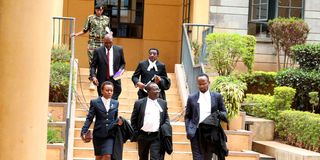Azimio steps up criticism of Supreme Court

Azimio lawyers at the Supreme Court on September 5. Mr Paul Mwangi (centre) and Prof Makau Mutua have criticised the court’s reasoning in upholding President William Ruto’s win.
What you need to know:
- Azimio claims that the apex court glossed over crucial evidence and allowed the IEBC to easily explain away grave violations of the law.
- Paul Mwangi and Makau Mutua, claim that the seven judges unfairly disregarded reports by the DCI that evidenced manipulation of the elections, and unfairly denied Azimio orders for scrutiny of voter identification kits.
- The two lawyers have faulted the Supreme Court for finding that voter identification kits used in the presidential election worked as required, yet no audit on the equipment has been done.
Azimio la Umoja One Kenya Coalition has upped its war on the Supreme Court claiming it failed in protecting Kenya’s democracy by upholding the election of President William Ruto.
In its criticism of the full judgment, the coalition on whose ticket Mr Raila Odinga and Ms Martha Karua unsuccessfully vied for the presidency, Azimio claims that the apex court glossed over crucial evidence and allowed the electoral body to easily explain away grave violations of the law.
Two of the coalition’s top lieutenants, Paul Mwangi and Makau Mutua, claim that the seven judges unfairly disregarded reports by the Directorate of Criminal Investigations that evidenced manipulation of the elections, and unfairly denied Azimio orders for scrutiny of voter identification kits.
The two lawyers have faulted the Supreme Court for finding that voter identification kits used in the presidential election worked as required, yet no audit on the equipment has been done.
The coalition claims that the judges contradicted themselves by finding that the elections were held in line with the constitution despite acknowledging there were vicious boardroom wars at the Independent Electoral and Boundaries Commission (IEBC).
“The court finds, like it had to, that there was a boardroom rapture and that the commission has to act in unison, but curiously finds that there is no violation of the constitution. Indeed, the Court dismisses its own holding about all the members of the Commission being involved by calling the happening at IEBC ‘quorum antics’. It even says that the issue it had just ruled on would set “a dangerous precedent” if the judges were to follow their own decision on the issue,” Azimio said in its statement.
Azimio further claims that the court allowed IEBC to interpret orders for scrutiny of its servers, which the coalition says led to a questionable inspection of the electoral body’s systems.
Mr Odinga’s coalition maintains that there were at least four foreigners that questionably accessed the IEBC’s systems during the elections, and faults the court for allegedly ignoring the issue.
“Shockingly, when the petitioners filed their own findings on the scrutiny demanded by court, the judges threw it out. They did not want to see the evidence,” Azimio said.
Prof Mutua and Mr Mwangi have further claimed that the Supreme Court ignored the fact that IEBC illegally used the second set of results transmission forms, despite the fact that presidential candidates had agreed to have the booklets stored unused inside ballot boxes.
The lawyers also hold that the judges ignored sections of the scrutiny report on some polling stations which showed that several of the booklets were missing.
“This virulent attack on the petitioners’ advocates was not based on any evidence of forgery or fabrication ... In the meantime, IEBC was never asked, and has not explained till today, what happened to Form 34A Book 2,” they said.
Mr Odinga’s charges believe that the Supreme Court acted as litigants by using words they deem to be harsh when dismissing the petition.
The coalition maintains that IEBC Chairperson Wafula Chebukati was allowed to fiddle with voter turnout figures and that the judges should have interrogated the electoral body’s boss further.





